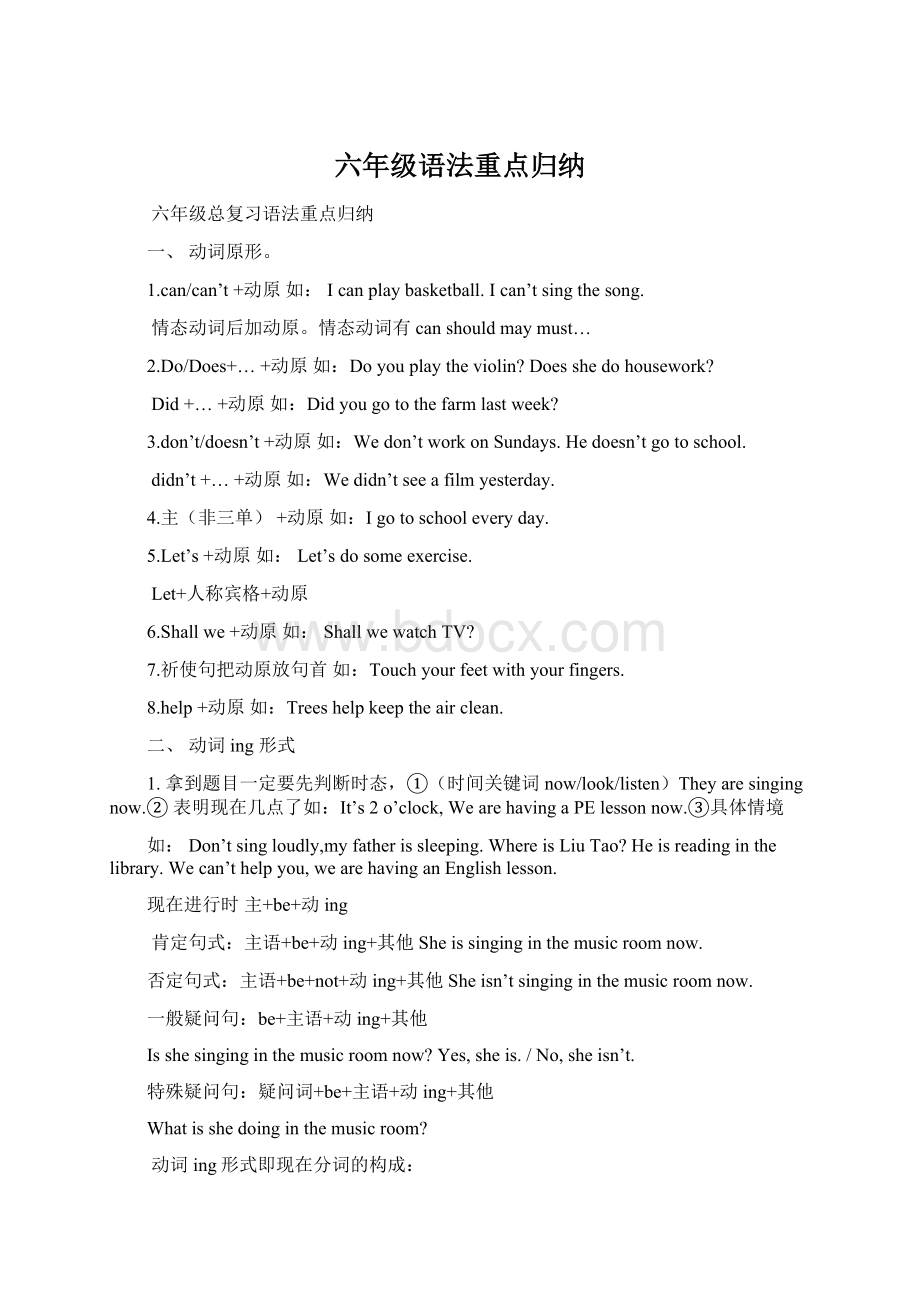六年级语法重点归纳Word文档格式.docx
《六年级语法重点归纳Word文档格式.docx》由会员分享,可在线阅读,更多相关《六年级语法重点归纳Word文档格式.docx(22页珍藏版)》请在冰豆网上搜索。

一般疑问句:
be+主语+动ing+其他
Isshesinginginthemusicroomnow?
Yes,sheis./No,sheisn’t.
特殊疑问句:
疑问词+be+主语+动ing+其他
Whatisshedoinginthemusicroom?
动词ing形式即现在分词的构成:
情况
构成方法
例词
一般情况
加-ing
jump-jumping;
see-seeingeat-eating
play-playingdraw-drawing
以不发音的e结尾
去e加-ing
take-taking;
skate-skating;
以重读闭音节结尾、末尾只有一个辅音字母
双写末尾辅音字母加-ing
get-getting;
jog-jogging;
run-running;
stop-stopping;
sit-sitting;
put-putting;
swim-swimming;
shop-shopping;
2.like/love+动ing如:
Ilikecollectingstamps.
3.go+动ing如:
Sheoftengoesclimbing.
4.howabout+动ing如:
Howaboutgoingtothecinema?
介词后+动ing
learnabout学习关于....后面加动词的ing形式
如:
I’lllearnaboutcookingontheInternet.
5.特殊句型:
doallthecookingandcleaning
6.No+动ing如:
Itmeans‘Nosmoking’.
7.start+动ing如:
Hestartsdrawing.
8.begoodat善于后面加名词或动名词(动词ing)。
JimisgoodatEnglish.
Wearegoodatplayingfootball.
三、to+动原
1.would(‘d)like+to+动原如:
I’dliketovisitShanghai.
2.want+to+动原如:
Iwanttobuythingsfortheparty.
3.forget+to+动原如:
Iforgettoclosethedoor.
4.need+to+动原如:
weneedtocleanthelibrary.
5.time+to+动原如:
It’stimetohavelunch.
6.how+to+动原如:
Howtomakeamodelplane?
7.behappy+to+动原如:
Wearehappytoseeeachother
8.besorry+to+动原如:
I’msorrytohearthat.
9.try+to+动原如:
Theytrytofollowtheorders.
10.beglad+to+动原如:
Iamgladtoseeyou.
11,have+to+动原如:
Wehavetostartthestoryagain.
12.benice+to+动原如:
Itwasnicetogetyouremail.
13.can’twaittodo,意思为迫不及待的去做某事。
四、拿到题目先判断时态。
当有onSundays/(星期)intheevenings/intheafternoons/inthemornings/often/usually/every…/sometimes/fromMondaytoFriday/always/like代表喜欢/have表示有。
的时候表示一般现在时态。
一般现在时
(1)定义:
表示通常性、规律性、习惯性的状态或者动作,表示主语具备的能力等。
(2)时间状语:
always,often,usually,sometimes,everyday(week…),onSundays(Mondays…)等。
(3)结构:
★肯定句:
主语+be动词+其他SheisanEnglishteacher.
主语(非第三人称单数)+动词原形+其他Ioftengetupatsix.
主语(第三人称单数)+动词第三人称单数+其他
Myfatherusuallygoestoworkbycar.
★否定句:
主语+be动词+not+其他Sheisn’tanEnglishteacher.
主语(非第三人称单数)+don’t+动词原形+其他Idon’toftengetupatsix.
主语(第三人称单数)+doesn’t+动词原形+其他
Myfatherdoesn’tusuallygotoworkbycar.
★一般疑问句:
Be动词+主语+其他IssheanEnglishteacher?
Yes,sheis/No,sheisn’t.
Do+主语(非第三人称单数)+动词原形+其他
Doyouoftengetupatsix?
Yes,Ido./No,Idon’t.
Does+主语(第三人称单数)+动词原形+其他
Doesyourfatherusuallygotoworkbycar?
Yes,hedoes./No,hedoesn’t.
(4)动三单的变化规则:
读音
加s
清辅音后读/s/浊辅音和元音后读/z/
like-likesswim-swims
以s,x,ch,sh结尾
加es
读/iz/
wash-washesteach-teaches
watch-watchescatch-catches
以辅音字母+y结尾
变y为i,再加es
study-studiesfly-flies
以元音字母+y结尾直接在y后加s就可以了。
buy-buys
主(非三单)+动原如:
主(三单)即一个人或者一个东西。
把人称转化成hesheit+动(s/es)
YangLinglikesgoingshopping
注意:
1.以ch\sh\结尾加es.如:
catches/watches/washes/teaches/touches
2.以y结尾的,当倒数第二个字母是辅音字母的,变y为ies.如:
studies
3.特殊的has/goes/does
五、一般过去时
当时间状语为:
…ago,justnow,yesterday,last…,onMonday,this…,in1999,oneday有时也可以表达过去时,fromthenon一般也用于过去时,thenextday也常用于过去时等。
一般过去时的句子结构:
主语+动词过去式+其他
主语+was/were+其他
否定句式:
主语+didn'
t+动词原形+其他
主语+was/were+not+其他
一般疑问句:
Did+主语+动词原形+其他
Was/Were+主语+其他
肯定回答:
Yes,主语+did/Yes,主语+was/were.
否定回答:
No,主语+didn'
t./No,主语+wasn'
t/weren'
t.
特殊疑问句:
疑问词(what,where,when,why,how等)+did+主语+动词原形+其他
疑问词(what,where,when,why,how等)+was/were+主语+其他
★Be动词:
肯定句:
主语+was/were+其他Iwasathomeyesterday.
Thechildrenwereintheplaygroundjustnow.
否定句:
主语+wasn’t/weren’t+其他Iwasn’tathomeyesterday.
Thechildrenweren’tintheplaygroundjustnow.
Was/Were+主语+其他
Wereyouathomeyesterday?
Yes,Iwas./No,Iwasn’t.
Werethechildrenintheplaygroundjustnow?
Yes,theywere./No,theyweren’t.
★行为动词:
主语+动词过去式+其他Nancydidhouseworklastweekend.
主语didn’t+动原+其他Nancydidn’tdohouseworklastweekend.
Did+主语+动原DidNancydohouseworklastweekend?
动词过去式变化规则:
动词过去式结尾ed的发音:
一般情况直接加-ed
以清辅音(除/t/)结尾读作/t/。
如,watched,washed,liked,danced等。
以浊辅音和元音(除/d/)结尾读作/d/。
如,lived,watered,showed,turned等。
以/t/和/d/结尾的读作/id/。
如,visited,shouted,pointed,needed等。
以不发音的字母e结尾加d,如:
like-liked
以“辅音字母+y”结尾的,变y为i,再加-ed,如:
study-studied
⑤不规则动词的变化,要逐一熟记:
am,is--was,are--were,do--did,go--went,have/has—had,eat—ate,get--got,drink-drank,fly-flew,come-came,make-made,get-got,sit-sat,see-saw,meet-met,take-took,become-became,buy-bought,bring-brought,wear-wore,meet-met,tell-told,stop-stopped,,write-wrote,read-read,say-said,become-became,lose-lost,can-could,find-found,catch-caught.
原形
过去式
make
made
see
saw
get
got
say
said
let
become
became
wake唤醒
woke
bite咬
bit
六、一般将来时态解析
a.定义:
表示将来某个时间要发生的动作或存在的状态,也表示将来经常或重复发生的动作,常与表示将来的时间状语连用。
tomorrow(…),nextweek(month,year…),this(afternoon,evening,weekend…)soon,someday,等。
b.句型结构:
begoingto动词原形will+动词原形
▲例句:
Iamgoingtobuysomenewclothesandfood.我将要去买一些新衣服和食物。
主语+begoingtodo…如:
Iamgoingtoplayfootballtomorrow.
主语+benotgoingtodo…如:
Iamnotgoingtoplayfootballtomorrow.
Be+主语+goingtodo…如:
Areyougoingtoplayfootballtomorrow?
疑问词+be+主语+goingtodo…
★注意点:
come,go可以用现在进行时表示一般将来时。
例句:
Thebusiscomingsoon.(公共汽车一会就来了。
)
Whereareyougoing?
(你将要去哪里?
C.begoing+to+动原表示将要做某事
begoing+to+地点表示将要去某个地方
⑤Mybrotherisgoingtopickapplesonthefarmnextweekend.
1234
1.Whoisgoingtopickapplesonthefarmnextweekend?
2.Whatisyourbrothergoingtodoonthefarmnextweekend?
3.Whatisyourbrothergoingtopickonthefarmnextweekend?
4.Whereisyourbrothergoingtopickapplesnextweekend?
一般将来时的特殊疑问句:
一般将来时的特殊疑问句是将疑问词放在句首,后接一般疑问句(就主语提问时,以疑问词who开头的疑问词除外)
例如:
Whoisgoingtobringdrinksfortheparty?
Helenis
Who’sgoingtobuysnacksanddrinksfortheparty?
WangBingis.
Whenaretheygoingtomeet?
Athalfpastthree.
Whereareyougoingtohavetheparty?
AtMike’shouse.
When’sthepartygoingtobegin/start?
Atoneo’clock.
When’sitgoingtoend?
Atfive.
What’sHelengoingtodofortheparty?
Sheisgoingtoplaypiano.
What’sMikegoingtobringtotheparty?
Heisgoingtobringsomeflowers.
will的用法
will+动词原形=begoingto+动词原形,构成一般将来时。
表示将来某个时间要发生的动作或存在的状态,常与表示将来的时间状语连用。
tomorrow,nextmonth(week,year…),soon,thisafternoon,thisevening等。
例:
I’llplayfootballtomorrow.=I’mgoingtoplayfootballtomorrow.
.
人称+will的缩略形式和完整形式:
缩略形式
完整形式
I’ll
Iwill
he’ll
hewill
you’ll
youwill
she’ll
shewill
we’ll
wewill
they’ll
theywill
WillyougotoBeijingbyplane?
你乘飞机去北京吗?
No,Iwon’t.不。
这是一般将来时的一般疑问句,句中的won’t是willnot的缩略形式。
will=begoingto,都可以构成一般将来时
Will+主语+动词原形+…?
Willshevisitherauntanduncle?
Yes,shewill./No,shewon’t.
won’t=willnot
疑问词+will+主语+动词原形+…?
Wherewillshego?
她将要去哪里
Whatwillshedothere?
她将在那里做什么?
Whenwillshego?
她将什么时候去?
Howlongwillshestaythere?
她将在那里待多久?
六、名词
名词复数:
①like+名词复数如:
Ilikeinsects.②Howmany+名词复数如:
Howmanytreesarethereinthegarden?
③种类表示复数如:
catch+名词复数如:
Ioftencatchinsects.
④different+名词复数如:
Wearefromdifferentcities.
⑤在一般现在时的时态里on+星期复数如SheoftensurftheInternetonFridays.
可数名词前有some/many/lotsof/these/those/大于2的数词后面也是名词的复数
名词的复数形式:
1.直接在名词后加S。
2.以s/es/ch/sh/x结尾的名词后加es.如:
boxeswatchesbuses
3.以辅音字母加y结尾,。
把y变成ies.
如study—studieshobby—hobbieslibrary—librariesbutterfly--butterflies
city—citiescountry–countries
以元音字母加y结尾,。
不要把y变成ies.直接在y后加s
如boy--boystoy--toysday-daysholiday-holidays
名词单数every+名词单数如:
everyweekeveryFriday.
mango---mangoespotato---potatoestomato---tomatoes这三个以有生命的字母o结尾的单词,复数形式是在末尾加上es.
表示数量的限定词:
some,alotof,afew,alittle,many,much
some,alotof既可以修饰可数名词,也可修饰不可数名词。
(还有any,lotsof)
Therearesome/alotofeggsinthefridge.
Thereissome/alotofmilkinthefridge.
afew和alittle是同义词,它们的区别:
afew的意思是“几个”,与可数名词连用。
Thereareafeweggsinthefridge.
alittle表示“一点儿”,与不可数名词连用。
Thereisalittlemilkinthefridge.
many和much都表示“许多”,它们的区别:
many与可数名词连用。
Therearemanyeggsinthefridge.
much与不可数名词连用。
Thereismuchmilkinthefridge.
常见的不可数名词的食品归纳:
bread,meat,rice,chocolate,milk,juice,tea,coffee,water,fruit,food…
【不可数名词】六液体:
water,milk,juice,coffee,tea,cola
五食物:
bread,rice,food,meat肉,fruit
五资源:
coal,oil,energy,plastic,wood
sweet名词:
糖果;
likesweets
形容词:
甜的;
sweetfood
有关职业的单词
worker工人teacher教师farmer农夫driver驾驶员
waiter服务员waitress女服务员cook厨师doctor医生
nurse护士engineer工程师policeman警察policewoman女警察
traveller旅行者
artist艺术家pianist钢琴家scientist科学家dentist牙医
astronaut宇航员dancer舞者player运动员writer作家
七、形容词+名词(“姓名”结构)
Sheisabeautifulgirl.Heisagoodstudent.
动词+副词(“豆腐”结构)
Shedancesbeautifully.Hestudieswell.
副词一般是在形容词后加ly